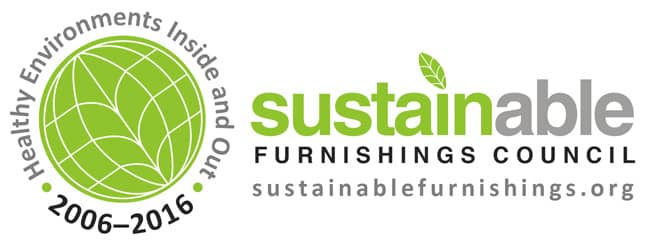New Research Shows Consumers More Concerned About Environmental Issues
Furniture World News Desk on
5/2/2016

The Sustainable Furnishings Council (SFC) recently released results of a new survey that reconfirms consumers’ concerns about a variety of environmental issues and finds that the great majority of them are taking positive action in their homes to address these issues.
Virtually all of those surveyed had opinions about a variety of big-picture environmental issues, with 4 in 5 or more being “very concerned/concerned” with issues such as toxic pollutants in the waste stream, overloading landfills, using up natural resources, extinction of species, and deforestation/loss of rain forests. And, whether their families have been directly affected or not, close to 9 in 10 expressed concerns about hazardous indoor air quality (88%, net) and global warming (86%, net).
Topping the list of sustainable efforts taken by consumers are recycling (74%) and using compact fluorescent lightbulbs (73%). Additional mindful changes in the home include adjusting the thermostat lower in the winter and higher in the summer (60%), reducing consumption of bottled water (49%), and cutting back on driving (41%).
While this study confirms that consumers are taking a level of action toward a greener lifestyle, designating a product as “green” can in some instances cause a negative reaction. Although 69% (net) of consumers had positive associations regarding products claiming to be “green,” in other instances 62% (net) reported negative connotations. These concerns are that green products would be too expensive, not perform as well as other options, would be harder to find and/or not be as aesthetically pleasing.
According to Susan Inglis, Executive Director of Sustainable Furnishings Council, "This is a caution to sales professionals that we should choose our words carefully. Though we are excited to see that more consumers than ever would buy eco-friendly furnishings AND that fewer than ever are ‘uninterested,’ it is a caution to sellers that these consumers are so unaware of what is available at all price points and in all styles. We at SFC see the opportunity for businesses across the industry to grow sales by telling their eco-stories. Further, we are pleased to provide the training companies may need to get the word out about what they already have on their floor. We see this information about consumer concern as a huge opportunity to strengthen the industry!"
Findings from the study reveal more effective phrases and words that can be used when marketing in this category. The #1 ranked preferred term is “environmentally safe” (28%) followed by “eco-friendly” (24%) and “sustainable” (15%). When it comes to other “green” options in home furnishing that consumers are familiar with, Energy Star rated ranks first(70%), followed by recycled content (55%), reclaimed wood (49%), organic fabrics (45%), and certified wood (23%).
Sustainable Furnishings Council makes the full research report available to all SFC member companies. Industry professionals should contact admin@sustainablefurnishings.org to join and request a copy.
The 2016 Sustainable Home Furnishings Study was an online research study probing home furnishings and environmental issues and was conducted on behalf of the Sustainable Furnishings Council by Fairfield Research with support from Hearst Design Group. The study sample consisted of US women homeowners age 30-60, with an HHI of $50K+, who spent at least $500 in home furnishings in the past 52 weeks. The sample was provided by Survey Sampling International and fielded February 3-10, 2016.